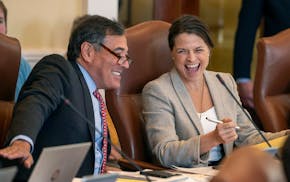The Minnesota House fell silent Thursday evening as an attempt to revive the proposed 'right to work' constitutional amendment fizzled.
A House spokeswoman said Rep. Doug Wardlow, a first-term Republican from Eagan, offered a motion to remove the stalled bill from one committee and send it to another. The House recessed so Republicans could have a private caucus before the motion came up.
It is not unusual for members to try to "re-refer" their bills for various reasons. What made this unique was that Wardlow was not the bill's sponsor -- the person who usually has say over where an issue goes. The sponsor, Rep. Steve Drazkowski, R-Mazeppa, said he opposed Wardlow's motion to move his bill. Wardlow is listed as one of many co-sponsors of the bill.
House Speaker Kurt Zellers, R-Maple Grove, read the motion and waited for several minutes, presiding over a quiet House, because Wardlow had not returned to the floor from the caucus. Zellers then concluded the session without acting on the motion.
Wardlow briefly appeared as the session was ending and left without commenting. Drazkowski did not comment further and said he did not know if his bill would move this session.
The 'right to work' is proposal would do away with contracts that require workers to pay dues or fees even if they choose not to join an existing union representing those workers. It is offered as a proposed constitutional amendment, skirting the opposition of DFL Gov. Mark Dayton. If the Republican-controlled Legislature approves it, it would go on the November ballot.
Unions and DFLers bitterly oppose the measure, and union members crowded into the Capitol when the Senate Judiciary and Public Safety Committee gave it a 7-6 victory on March 12. House Majority Leader David Senjem, R-Rochester, has since said the bill does not appear to have enough Republican support to pass, and is stalled. Senate supporters are trying to again revive it.
In the House, several prominent Republicans have opposed the measure, and its prospects are uncertain. Wardlow's move seemed to be an attempt to jump-start the bill. But House Republican Caucus spokeswoman Jodi Boyne said having one member try to re-direct another member's bill is a "dangerous precedent."
The Senate took a similar route to re-start the bill and succeeded, at least temporarily. A motion on the Senate floor to move the bill from the Jobs and Economic Growth Committee to the Judiciary and Public Safety Committee succeeded on a 34-30 vote March 8, resulting in the hearing and vote in the Judiciary committee.
The Latest | A second seated juror is dismissed from Trump's hush money trial

Biden scores endorsements from Kennedy family, looking to shore up support against Trump and RFK Jr.

